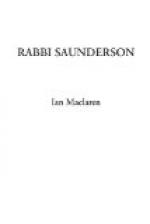Times there were, however, when the Presbytery rose to its height and was invested with an undeniable spiritual dignity. Its members, taken one by one, consisted of farmers, shepherds, tradesmen, and one or two professional men, with some twenty ministers, only two or three of whom were known beyond their parishes. Yet those men had no doubt that as soon as they were constituted in the name of Christ they held their authority from the Son of God and the Saviour of the world, and they bore themselves in spiritual matters as His servants. No kindly feeling of neighbourliness or any fear of man could hinder them from inquiring into the religious condition of a parish or dealing faithfully with an erring minister. They had power to ordain, and laid hands on the bent head of some young probationer with much solemnity; they had also power to take away the orders they had given, and he had been hardened indeed beyond hope who could be present and not tremble when the Moderator, standing in his place, with the Presbytery around, and speaking in the name of the Head of the Church, deposed an unworthy brother from the holy ministry. MacWheep was a “cratur,” and much given to twaddle, but when it was his duty once to rebuke a fellow-minister for quarrelling with his people, he was delivered from himself, and spake with such grave wisdom as he has never shown before or since.
When the Presbytery assembled to receive a statement from Doctor Saunderson “re error in doctrine by a brother Presbyter,” even a stranger might have noticed that its members were weighted with a sense of responsibility, and although a discussion arose on the attempt of a desultory member to introduce a deputy charged with the subject of the lost Ten Tribes, yet it was promptly squelched by the clerk, who intimated, with much gravity, that the court had met in hunc effectum, viz. to hear Doctor Saunderson, and that the court could not, in consistence with law, take up any other business, not even—here Carmichael professed to detect a flicker of the clerkly eyelids—the disappearance of the Ten Tribes.
It was the last time that the Rabbi ever spoke in public, and it is now agreed that the deliverance was a fit memorial of the most learned scholar that has been ever known in those parts. He began by showing that Christian doctrine has taken various shapes, some more and some less in accordance with the deposit of truth given by Christ and the holy Apostles, and especially that the doctrine of Grace had been differently conceived by two eminent theologians, Calvin and Arminius, and his exposition was so lucid that the clerk gave it as his opinion afterwards that the two systems were understood by certain members of the court for the first time that day. Afterwards the Rabbi vindicated and glorified Calvinism from the Scriptures of the Old and New Testament, from the Fathers, from the Reformation Divines, from the later creeds, till the brain of the Presbytery reeled




